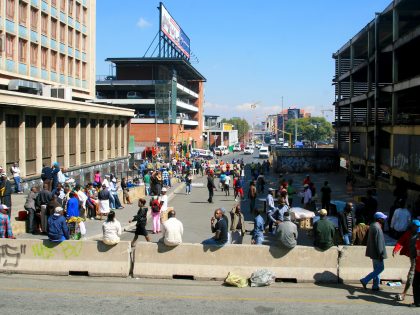
The gossip bros
The age of the podcasters as thought leaders—think #PodcastandChill and The Hustlers Corner—is upon us.

The age of the podcasters as thought leaders—think #PodcastandChill and The Hustlers Corner—is upon us.

South African poet Don Mattera, who died in July, was the real deal—preferring to throw his lot in with the ignored and the undervalued. Unsurprisingly, his monumental life and work is undervalued too.

South African policing is a tool of social control and repression. Are democratic and humanistic alternatives possible? This week on the AIAC podcast, we discuss.

By using healthcare to attack immigrants, xenophobic political movements in South Africa echo long-standing right-wing obsessions.

South African companies can afford to pay their workers a living wage—if not for their commitment to profit shifting, as the case of Lonmin and Marikana showed.

The Israel/Palestine system meets the definition of apartheid in international law, but presents different challenges for the campaign against it than was the case for the anti-apartheid movement in South Africa.

Revisionist histories of South Africa’s transition to democracy are overdue, like on the deadly march on Bisho in the Ciskei homeland on 7 September 1992.

Zoë Wicomb thinks she knows why black South African readers appreciate Damon Galgut’s Booker Prize-winning novel 'The Promise' (2021) whilst many white readers were turned off by it.

For the 10th anniversary of the Marikana massacre, we are planning a public event on August 20th to reflect on its legacies.

Why do representative bodies like the union, the party, and the so-called Left seem to fail its constituents during struggles like Marikana?

Accountability—insofar as it ever existed within the South African Police Service—has been reduced to a merely theoretical concept. It is time this changed.

In South Africa, the seismic shifts in unionism triggered by the Marikana Massacre have sadly not resulted in a union movement better equipped to tackle the issues that workers face.

The impact of the Marikana massacre on South Africa’s student movement for free education, and an end to outsourcing, has been overlooked.

We know an enormous amount about what precipitated the 2012 Marikana massacre, but relatively little about what is behind the violence there since.

The Marikana Massacre changed democratic South Africa forever. It can also catalyze resistance to the current order.

South Africa’s ruling party’s devotion to its policy of cadre deployment is an indication that it values its own power more than the public interest.

Why languages, particularly black African languages, have become a battleground in postapartheid power and identity politics in South Africa.

Before the Soweto Uprising in 1976, students and workers organized one of the largest strike actions in South Africa’s history.

What happens to the contemporary explosion of moral panics, urban legends, and other paranoid narratives when they manifest in a place like South Africa?

The ANC and Nelson Mandela’s turn to violent anticolonial struggle in the early 1960s, is the subject of a new book by historian of South Africa, Paul Landau.